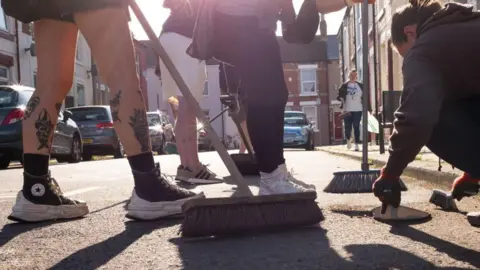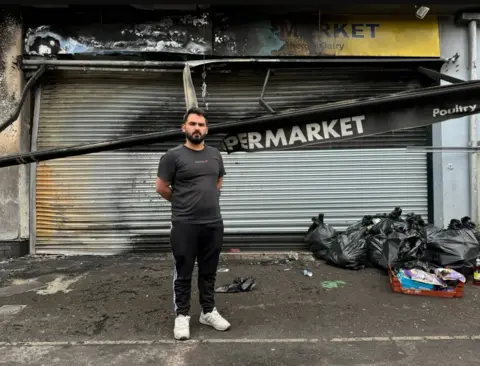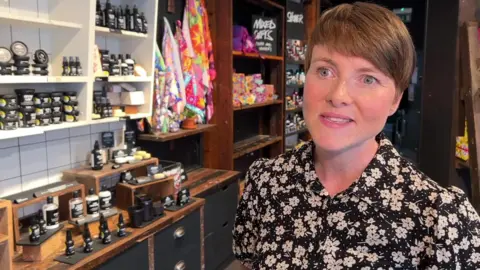 Getty Images
Getty ImagesThe wave of riots in UK towns and cities risks leaving a “scar” on High Streets and businesses, a trade body has warned.
Looting and vandalism of businesses recovering from Covid and trying to compete with online shopping is “not a victimless crime”, the chairman of the Federation of Small Businesses (FSB) told the BBC.
Over the weekend, shops have been burnt out and hotels housing asylum seekers targeted in violent protests.
It follows a stabbing attack in Southport last week in which three children attending a dance class were killed.
Martin McTague, chairman of the FSB, told the BBC’s Today programme the “mayhem” is “having a devastating impact” on businesses and local communities when High Streets have already been suffering.
The damage would likely take months and millions of pounds to clear up, he added, calling on central and local government to work together to support smaller firms.
The owner of a supermarket and cafe in south Belfast which was targeted told the BBC that “everything he has built” living in Northern Ireland for eight years had been destroyed.
“Everything is done, my life is done,” he told BBC News NI, as he does not have the financial means to rebuild the property.
 Pacemaker
PacemakerRetail NI’s chief executive Glyn Roberts described the weekend’s attacks on Belfast businesses as “despicable”.
“Racism has no place in our community,” he said, adding that those behind the action should be “brought to justice”.
Dr Rachel Doern from Goldsmiths University said the overall impact of the riots across UK town and cities would be “enormous”.
She said small, independent businesses in particular may be forced to close their doors for good, while others may struggle financially and psychologically for years to come.
Her previous research suggested that more than 2,000 mostly small, independent businesses were affected by the London riots in 2011, which led to five deaths and saw properties and shops across England destroyed.
It estimated that the four days of violence cost the UK between £200m and £500m in damages, lost trade and policing.
Owners of franchises and branches of bigger brands have also spoken out after their stores were targeted.
Retailer Lush, best known for its cosmetics and fragrant beauty products, saw its shop in Hull damaged and looters were pictured leaving the store with handfuls of bags and boxes.

The company said it was “devastated” about what has happened to its “beautiful shop” in Hull, as well as other nearby retailers.
Its head of retail for UK & Ireland, Kasey Swithenbank, said it was proud to be part of a “multi-racial Britain” and that its shop manager and workers had “worked tirelessly” to get the shop ready to start trading again on Wednesday.
On-site, contractors helped repair windows and doors while cleaners worked through the night after soap products had been smashed against walls, she said.
In Sunderland, one travel consultant at the Hays Travel Vine Place branch said that two young protestors had thrown bricks through their windows during the weekend.
She questioned why the firm was targeted as a Sunderland-based business that tries to do good and said that the protestors did not represent the city.
On Monday, the boss of the British Retail Consortium said that many would have been heading to work fearing that their safety could be compromised by the vandalism that has taken grip in some parts of the country.
Helen Dickinson said some retail workers were spending their day cleaning up damage and in some instances may not be able to visit their local stores.
Hotel workers were also left shaken when rioters descended on two Holiday Inn Express sites over the weekend.
People who were inside the Rotherham hotel said they had to push fridges and other furniture against a door to create a makeshift barrier.
A shaken hotel worker, who did not want to be identified, described the experience as “absolutely terrifying”.
About 240 asylum seekers who had been staying at the hotel were moved overnight after clashes between police and a crowd of hundreds of people.
IHG Hotels, which owns the Holiday Inn brand, the safety and security of guests and colleagues was always its priority.
Mr McTague had also questioned how businesses would be able to fund the clean-up operations needed.
The Association of British Insurers said that individuals, homeowners and businesses affected would all be “understandably” worried and distressed.
They pointed out that physical damage to homes or businesses is covered as standard by most household or business insurance policies.
Some policies will also cover businesses whose sites have not been damaged but may have had to close up and lost trade in the aftermath, but their spokesperson said it was best for firms to check with their insurers as soon as possible.
Since, local residents have also taken to the streets of towns and cities where unrest broke out over the weekend, helping with tidy-up missions and supporting others in the community.
Home Secretary Yvette Cooper said it was these people who “speak for Britain” – not those who took part in the violence.
